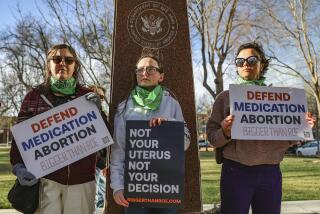Justices Signal Rejection of Right to Die
- Share via
WASHINGTON — Supreme Court justices, listening to two hours of arguments Wednesday on the most emotionally charged issue of recent years, left little doubt they will reject the notion that dying persons have a right to medical help to end their lives.
Nearly every justice expressed wariness over issuing a ruling that would create a new, untested and practically unlimited right to assisted suicide. No one on the bench spoke in favor of the idea.
“You are asking us in effect to declare unconstitutional the laws of all 50 states,” said Justice Anthony M. Kennedy, sounding incredulous.
“I confess I don’t see the limit” if such a right is declared, added Justice David H. Souter. If dying persons are entitled to doctor-assisted suicide, why not other persons who are suffering chronic pain or have incurable illnesses, he asked.
Deciding who would have the right or who would not “would result in a flow of cases through the court system for heaven knows how long,” said Justice Sandra Day O’Connor.
The tenor of the justices’ questions and comments strongly suggested that the court will reverse two lower court decisions upholding assisted suicide, leaving the matter to be debated and decided state by state.
The abortion issue loomed large in Wednesday’s argument, even though it was directly mentioned only a few times.
In 1973, a more assertive Supreme Court struck down traditional laws in most states and ruled that doctors and their pregnant patients had the right to choose abortion. However, that ruling in Roe vs. Wade set off a backlash that continues today.
A majority of the justices who have joined the court since then were appointed by presidents who thought the abortion ruling was a grave error.
Even Justice Ruth Bader Ginsburg, a women’s rights advocate appointed by President Clinton, once said in a speech that the court had gone too far, too fast by declaring abortion a fundamental right.
As a result, the current court appears determined to tread cautiously, or better yet, to turn over hard decisions to the states and their elected lawmakers.
That attitude was apparent in the questions Wednesday.
“Is this ever a proper question for courts as opposed to legislators?” Ginsburg asked at one point.
Souter, a 1990 appointee of President Bush, said the justices, and indeed the entire nation, need to know more about assisted suicide before making a dramatic change in the law.
“This is all fairly recent,” he said. “Twenty years ago, we weren’t even discussing this issue.” Wouldn’t it be better to “leave it to the political process?” he asked.
Seattle attorney Kathryn L. Tucker, who represents a group of terminally ill patients and their doctors, replied that state lawmakers have shown little interest in the fate of dying persons.
“This court has never left the protection of vital constitutional liberties to the political process,” she said.
One of the two cases that were heard Wednesday began with a Seattle group known as Compassion in Dying. It is a small group of volunteers who counsel patients who are terminally ill. While they do not give or get lethal medicine for the dying persons, they sometimes advise them on how to obtain it. Usually they also sit with these patients during their final hours.
Under the law in Washington state, as in California, it is a crime for a doctor, a relative or even a volunteer to “aid or assist” someone in ending his life.
In March, the U.S. 9th Circuit Court of Appeals said this broad law is unconstitutional because it denies “mentally competent, terminally ill” persons the right to control their deaths.
“Dying citizens in full possession of their mental faculties at the threshold of death due to terminal illness [should] have the liberty to choose to cross that threshold in a humane and dignified manner,” Tucker told the court. And to do that, “they need the assistance of a physician.”
But Washington state Assistant Atty. Gen. William L. Williams urged the justices to reverse the appeals court ruling and uphold the state law.
A court-created right to assisted suicide is “contrary to our tradition and overrides the important state interests,” he said in arguing the case (Washington vs. Glucksberg, 96-110).
He noted that in 1991, Washington’s voters, by a 54%-46% margin, rejected a ballot initiative that would have allowed doctor-assisted suicide.
Three years ago, by contrast, Oregon became the first state to authorize assisted suicide. Its voters approved an exception to state law that would allow doctors to give lethal medicine to dying persons who request it. That law, however, has been put on hold by a federal judge in Portland.
The second hour of argument was devoted to another case (Vacco vs. Quill, 95-1858).
While New York Atty. Gen. Dennis Vacco defended his state’s ban on assisted suicides, Harvard University law professor Laurence H. Tribe argued that it is confused and irrational. It is a policy of “winks and nods,” Tribe said, in which doctors are left to starve some dying patients or kill them through “terminal sedation.”
U.S. Solicitor General Walter Dellinger, representing the Clinton administration, sided with the state officials, saying that doctor-assisted suicide could become the medical profession’s “cheap and easy expedient” method of treating terminally ill patients.
Only Justices John Paul Stevens and Stephen G. Breyer sounded somewhat sympathetic to the arguments in favor of assisted suicide.
Breyer, whose wife works with cancer patients, noted that medical studies say only 1% or 2% of patients need to die in pain, yet 25% or more do die in pain. “I suppose that first fact isn’t much help to the people in the second category,” Breyer commented.
More to Read
Get the L.A. Times Politics newsletter
Deeply reported insights into legislation, politics and policy from Sacramento, Washington and beyond. In your inbox twice per week.
You may occasionally receive promotional content from the Los Angeles Times.











